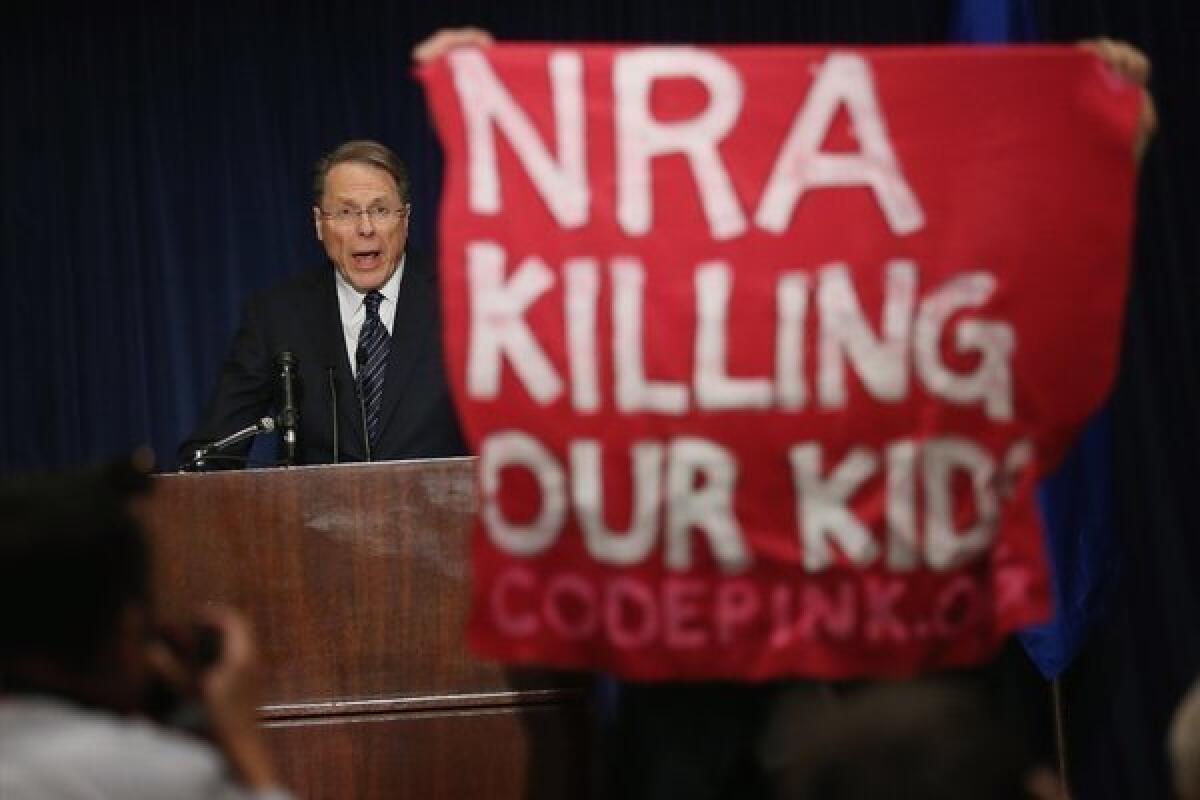Gun lobby has squelched injury prevention research, doctors charge

One week after 20-year-old Adam Lanza used guns to kill 20 first-graders and seven adults before shooting himself, two physicians published a Viewpoint article in the Journal of the American Medical Assn. asking what the medical and public health community can do to prevent massacres like the one at Sandy Hook Elementary in Newtown, Conn., from being repeated.
“What actions can the nation take to prevent more such acts from happening, or at least limit their severity?” they wrote. “More broadly, what can be done to reduce the number of US residents who die each year from firearms, currently more than 31,000 annually?”
These are trick questions. If you keep reading, you’ll learn that the gun lobby and members of Congress who share its views have made a concerted effort to stifle research on preventing injuries and deaths that are due to guns.
Both authors – Dr. Arthur L. Kellermann of RAND and Dr. Frederick P. Rivara of the University of Washington – were actively studying these issues between 1985 and 1997. But that work came to an abrupt halt after “pro-gun members of Congress mounted an all-out effort to eliminate the National Center for Injury Prevention and Control at the Centers for Disease Control and Prevention,” they write.
The Center survived, but the CDC budget was cut by $2.6 million – “precisely the amount the agency had spent on firearm injury research the previous year.” And lest anyone miss the message, the budget included this admonition: “None of the funds made available for injury prevention and control at the Centers for Disease Control and Prevention may be used to advocate or promote gun control.”
Kellermann and Rivara pick up the story from there:
“Precisely what was or was not permitted under the clause was unclear,” they wrote. “But no federal employee was willing to risk his or her career or the agency’s funding to find out.” In short order, research in the field “dried up.”
The National Institutes of Health became a target of a similar attack after the 2009 publication of a study that sought to answer the question of “whether carrying a gun increases or decreases the risk of a firearm assault,” as the doctors put it. The study was funded by an arm of the NIH, the National Institute on Alcohol Abuse and Alcoholism. As thanks, Kellermann and Rivara wrote, “Congress extended the restrictive language it had previously applied to the CDC to all Department of Health and Human Services agencies, including the National Institutes of Health.”
So today, as the nation searches for answers after a massacre that riveted the nation, the medical research community has little to offer. But it didn’t have to be that way, the doctors argued:
“Injury prevention research can have real and lasting effects. Over the last 20 years, the number of Americans dying in motor vehicle crashes has decreased by 31%. Deaths from fires and drowning have been reduced even more, by 38% and 52%, respectively. This progress was achieved without banning automobiles, swimming pools, or matches.”
By their tally, more than 427,000 Americans have died of gunshot wounds since Congress implemented its first research ban in 1997. “To put these numbers in context, during the same time period, 4,586 Americans lost their lives in combat in Iraq and Afghanistan.”
And the gun lobby isn’t resting, the doctors warn. Their latest push is to pass state laws that would put healthcare providers at risk of losing their licenses if they ask their patients about guns or even discuss firearm safety.
One such law – HB 155 – was passed in Florida last year, but a federal judge has issued a preliminary injunction to stop it from taking effect while the matter plays itself out in the courts. Seven other states are considering similar bills.
“The United States has long relied on public health science to improve the safety, health, and lives of its citizens,” Kellermann and Rivara conclude. “Perhaps the same straightforward, problem-solving approach that worked well in other circumstances can help the nation meet the challenge of firearm violence. Otherwise, the heartache that the nation and perhaps the world is feeling over the senseless gun violence in Newtown will likely be repeated, again and again.”
You can read the Viewpoint on the JAMA website.
Return to the Booster Shots blog.
Follow me on Twitter @LATkarenkaplan




